Last night, for the first time in years, my daughter slept in her own bed.
When the sleepover arrangement began (pre-divorce, post-intuition) her presence beside me felt like a negotiation. On the nights she stayed with her father, I luxuriated in the solitude, the emptiness of the mattress a kind of relief. But last night, her absence was sharp. Not a break, but a severing.
We had our routine: we argued over when to turn off the iPad, over why I (uniquely and irreparably) ruined her life by divorcing her father, and then settled into a book we’d already read so many times we could practically recite it. But it was the final part I craved: when the lights went out, the meditation podcast hummed to life, and I scratched her back until her breathing slowed into sleep.
Last night, there was nothing to reach for. The absence of her spine under my hand, her curled warmth tucked into the crook of my body, her breath tapering into a small snore; it all collapsed into a terrible vacuum. I listened for her in the next room, not because I feared she was gone, but because I wasn’t sure I was still here.
Alone in the dark, my body noticed itself. Loneliness crept up and walloped me. I fixated on someone I thought I might have dated, but didn’t. I reconsidered my last situationship and wondered if I should have accepted a smaller, emptier version of love. I combed through every recent decision that might have secured my solitude. I did the math of unlovability. Then I built tomorrow’s escape hatch, a network of plans and contingencies to prevent this particular ache from returning.
During the day, I’m on the phone, teaching on zoom, in motion, crossing off tasks. I schedule appointments, text back, send voice notes, make lists. I fill the silence with effort, activity, caffeine, intention. But nighttime is something else. When everything goes still, I stop performing at being okay. The part of me that once had someone to account for is now left with only my own pulse. It’s not grief, exactly. It’s exposure.
Loneliness, I’ve come to understand, isn’t the same as being alone. A bad marriage can be a profoundly lonely place, maybe lonelier than this. I remember living beside a man I no longer trusted with my inner life and still feeling obligated to try and explain who I was. I would narrate my feelings like a translator without an audience, hoping my effort alone might pass for connection. There’s a specific kind of erosion that comes from being regularly misunderstood by the person closest to you: it doesn’t just clip intimacy, it quietly convinces you that you’re unspeakable. That the failure to be known by this person is evidence of something broken in you.
Now there is no one to report to. No shared narrative to insert myself into. No one waiting for me to go to sleep so they can start their evening without me.
The ache I feel now is quieter, but sharper. More existential than interpersonal. Less about missing someone in particular, and more about facing the vacuum left when there is no one to witness your life in real time. At least in partnership your aloneness is contested. At least there is the illusion of connection, its mirror image.
We are trained (culturally) to resist loneliness, correct it, reframe it. I’ve eaten the myth of the missing other, the half that will complete the circle. Aristophanes' version of love: the human split in two, condemned to search forever for their lost twin (I’m a Gemini, after all).
But what if the longing itself is the illusion? Maybe the ache isn’t for a person at all, but for interruption, or witness, or noise. For friction, companionship, the press of someone else’s boredom against mine. For proof of existing in someone else’s peripheral vision. For a rhythm that might drown out the quieter question beneath it: Who am I without anyone watching?
This doesn’t mean I don’t still want connection. It just means I’ve started to question what it is I think I’m reaching for. The fantasy of an anchor, or the imagined relief of not having to hold the full weight of my own attention. But the goal can’t be reunion with some metaphysical partner. It’s becoming able to bear the silence without needing it to answer back.
I know that the answer is to sit in it. Not to fix the feeling, but to know it. To meet it where it lives in the body: in the throat, in the stomach, in the hand that has no back to scratch. To believe that something happens, quietly, in the recognition of one’s own solitude. That staying is not a punishment, but a kind of reverence.
Presence doesn’t arrive with certainty or a goodnight kiss or the ping of a new message. It doesn’t announce itself with language. Sometimes it’s just a room you don’t try to leave. Or maybe it’s what’s left when the longing lets go of you, not the person or the narrative, but the impulse to search.
And maybe that’s the beginning of something else. Not joy, not comfort exactly, but a slow return to the self. The kind that doesn’t require witness. The kind that can fall asleep alone, and still feel real.







